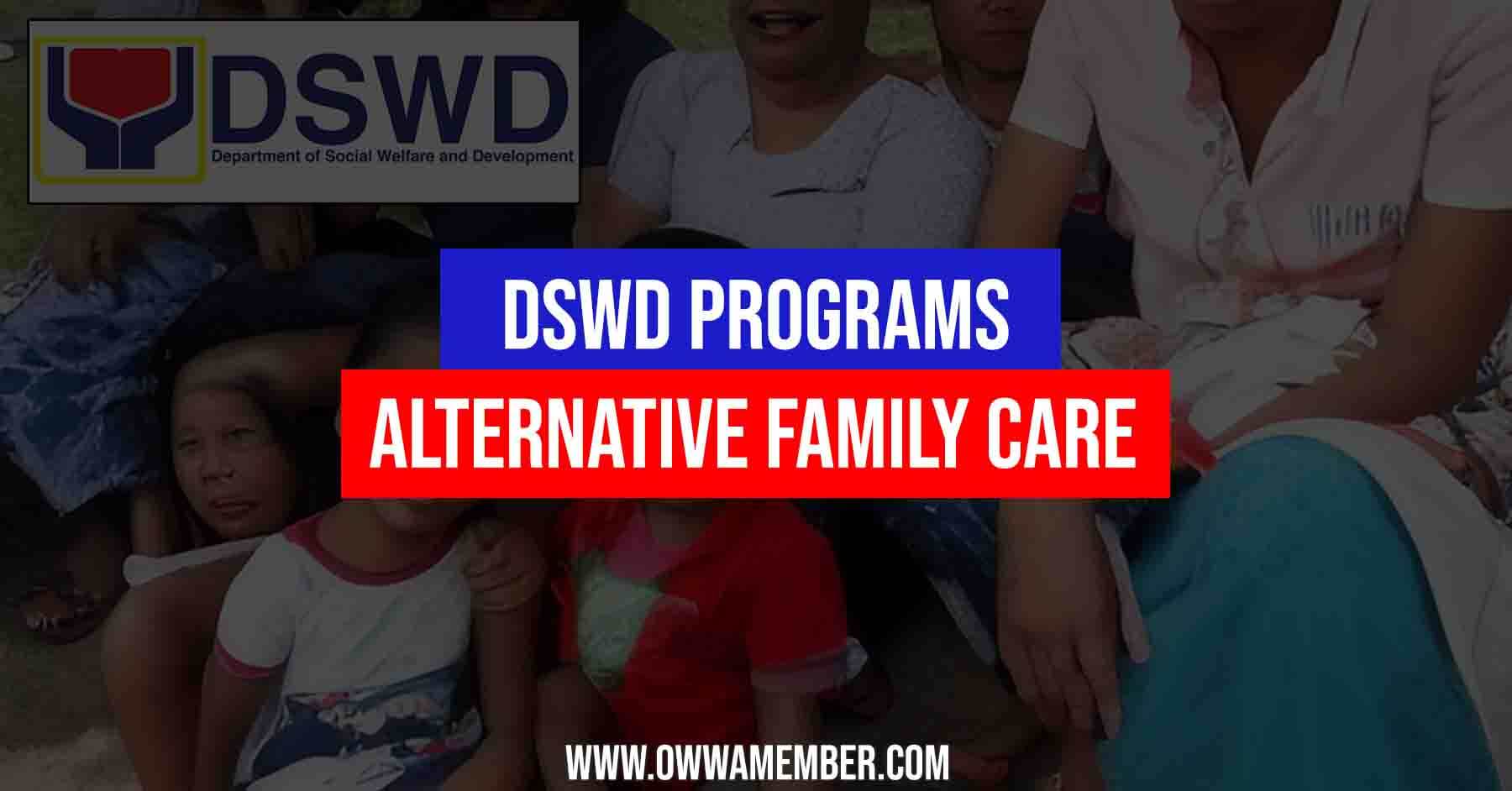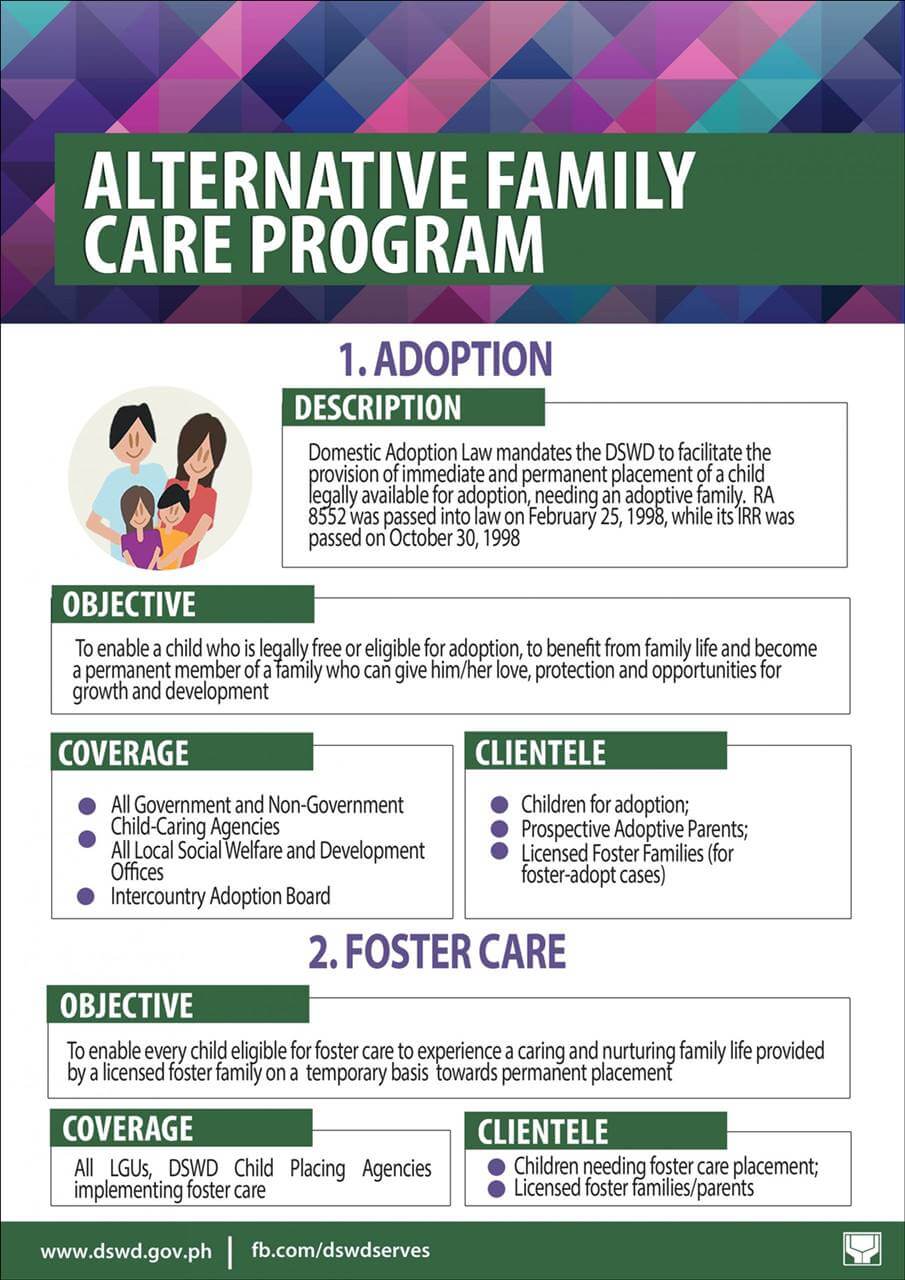The DSWD Alternative Family Care Program provides care and protection to children who are orphaned, abandoned, or neglected, and puts them in foster families or group homes. The goal of the program is to provide these children with a loving and supportive family environment so that they can thrive and develop into healthy and successful adults.
The Alternative Family Care Program is operated by the Department of Social Welfare and Development (DSWD). The program began years ago and since then it has helped thousands of children in the Philippines find permanent homes with loving families.
Having parents or guardians is very important for a growing child in order to have someone that will take care of them, provide for their needs and teach them to be good citizens. But what if the parents are not able to do this responsibility? It may be because of death or illness, drug addiction or abuse of some kind, imprisonment, or any other reasons that prevent them from performing their parental duties.
When this happens children need alternative family care because they will be spending most of their time with these other adults. In this case, they need someone to take the place of their parents.
The Department of Social Welfare and Development or DSWD Alternative Family Care Program is designed for children who have nobody else to care for them when the family cannot fulfill its role as caregiver.
Contents

What is DSWD Alternative Family Care Program?
The DSWD Alternative Family Care Program provides placement services and child care programs to children in particular with difficult situations whose parents are incapable of caring for and giving them their basic needs, either permanently or temporarily due to problems in illness, family relationships, extreme poverty, lack of family support, and a lack of parenting preparation.
The DSWD alternative family care provisions may be supplied through the foster care program and legal adoption, in which the applicant obtains requirements and documents facilitated by the Referral Section and Adoption Resource of the DSWD.
- Legal adoption is a legal process whereby a child is assigned to a new family, either voluntarily or involuntarily, and granted all the legal rights and responsibilities of that family. It allows children that are legally free or adaptable to participate in family life and be a permanent part of the family that can provide him or her with love, opportunities for development and growth, and protection.
- The Foster Care program, on the other hand, allows every child in foster care to feel and experience a nurturing and caring family life given by licensed foster parents on a temporary basis in preparation for permanent placement. It provides children with an environment that provides care, protection, and support to enable them to grow into healthy, productive members of society. Both the foster care program and legal adoption help ensure that the needs of vulnerable children are met and that they have a safe and stable family life.
Benefits
The following are the benefits offered by DSWD Alternative Family Care Program:
- Permanent or temporary placement with a licensed foster family or legal guardian
- Opportunities for development and growth in a safe and caring environment
- Protection and support to enable children to grow into healthy, productive members of society
Qualifications
Who are the children th at can be placed in foster care?
- An abandoned, neglected, surrendered, dependent, or orphaned;
- A victim of sexual, physical, or any other form of abuse or exploitation;
- Children with special needs;
- A child whose parents are unable or unwilling to take care of them.
- A child who is awaiting adoption must be ready for family life;
- Children who need constant support and care but cannot be placed for domestic adoption.
- Children whose adoption was stopped
- A child who lives in difficult social circumstances, including but not limited to being a street child, a victim of armed conflict or trafficking
- A child who has engaged in a minor offense but has been released on recognizance is under custody guidance, or whose case has been dismissed; and
- A child is deemed to need special protection by an agency, a social worker, or the DSWD.
Who are the children that can be adopted?
- Any person under the age of eighteen (18) that has been judicially or administratively declared available for adoption;
- One spouse’s legitimate son or daughter with the other spouse
- An illegitimate son or daughter adopted by the qualified adopter in order to elevate his or her condition to that of validity;
- A person is of legal age if, before the adoption took place, said person was always considered and treated by the adopter(s) as their own child since they were a minor.
- A child whose adoption has previously been revoked; or
- A child to which adoptive or biological parents (s) have died: Given, however, that no proceedings will be conducted within six months of the said parent’s death.

Requirements
Requirements for the Adoptive Parents
- Birth Certificate
- Application Form
- Divorce Annulment, Marriage Certificate, the Declaration of Nullity papers for legal separation. (if any)
- Certificate of Attendance to the Adoption Forum
- Adoption Written Consent
- Medical Certificate that is issued at least six months
- Three letters of Character References
- Certificate of Employment or Latest Income Tax Return
- Police Clearance or NBI – National Bureau of Investigation Clearance issued at least 1 year
- 3 by 5 inch-sized whole body picture of the applicant
Requirements for the Foster Care
- Birth Certificate
- Application Form
- Divorce Annulment, Marriage Certificate, the Declaration of Nullity papers for legal separation. (if any)
- Certificate of Attendance to the Foster Care Forum
- Medical Certificate that is issued at least six months
- Police Clearance or NBI – National Bureau of Investigation Clearance issued at least 1 year
- 3 by 5 inch-sized whole body picture of the applicant
- Barangay Certificate
Procedure
Procedure for Foster Care:
- Step 1: Attendance in the Foster Care seminar
- Step 2: Submission of the application to the Child-placing Agency or DSWD Field Office
- Step 3: Submission of the Home Study Report
- Step 4: Issuance of the Foster Family Care License
- Step 5: Matching
- Step 6: Placement
- Step 7: Supervision of the Foster Care placement
- Step 8: Termination of placement
Procedure for Adoption:
- Step 1: Attendance in the Adoption seminar
- Step 2: Submission of the application for adoption to the Child-placing Agency or DSWD Field Office
- Step 3: Preparation of the Home Study Report
- Step 4: Submitting the Prospective Adoptive Parents’ Case Records to the DSWD’s Adoption Resource and Referral Section (ARRS)
- Step 5: Matching (From Regional then Interregional)
- Step 6: Placement
- Step 7: Post-placement visits
- Step 8: Consent to the adoption
- Step 9: Filing of Petition for the Adoption
- Step 10: Adoption Decree Issuance and Entry of Judgment
Video
Video: DSWD, The Process of Legal Adoption
Here is the video of the legal process of adoption in the Philippines.
In the video, it was clearly stated that the government of the Philippines values respect for the rights and welfare of children, which is why it has a comprehensive program in place to ensure that these children are properly cared for and protected. This includes the Alternative Family Care Program, which helps vulnerable children who have been trafficked or who have run away from home to find safe and loving homes. Adoption is a process that is open to qualified individuals or couples who are willing to provide a loving and supportive home for these children.
Frequently Asked Questions
How Long Is The Duration Of Adoption In The Philippines?
On average, the adoption process—from application to finalization—takes about nine months, just like a typical pregnancy. The adoption process in the Philippines can be lengthy as it involves a thorough assessment of the suitability and readiness of prospective adoptive parents, as well as the matching of children with their adoptive families.
Do I Have To Pay To Adopt In The Philippines?
The potential adopter will have to pay for the necessary documents. Free services are available through DSWD, but prices for similar services from the accredited child placing agencies may differ.
Does The DSWD Adopt Children?
The adoptive families must go through the procedure from application up to the completion of the adoption of the child under the supervision of the licensed child-placing agency or the DSWD, Department of Social Welfare and Development such as the Kaisahang Buhay Foundation.
What Is RA No. 8552?
The Republic Act No. 8552 or the Domestic Adoption Law requires the DSWD to assist in the provision of permanent and adequate placement of children legally ready for adoption who requires an adoptive family. RA No. 8552 was signed into law on the 25th of February, 1998, and its IRR was signed into law on the 30th of October 1998.
Who May Foster?
Any Filipino citizen or a foreigner with residence status in the Philippines can serve as a foster parent if they meet the requirements set by DSWD and accredited child-placing agencies. These include age, marital status, financial stability, physical and mental health, criminal record checks, emotional ties with children, and other pertinent criteria.
Summary
The legal process of adoption and foster care in the Philippines involves a series of steps and procedures, from attending an adoption seminar to filing a petition for adoption. To ensure that all children are placed in loving and supportive homes, this process is overseen by the child-placing agencies and the Department of Social Welfare and Development (DSWD).